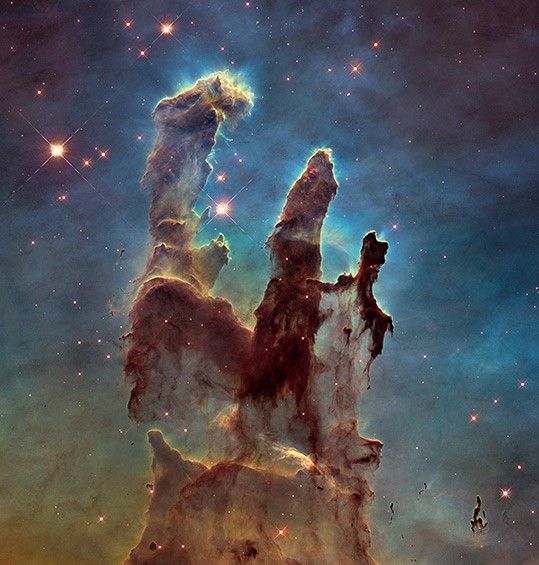1 min read
Compass Image for Substellar Objects in Orion

This image shows the central portion of the Orion Nebula, where the Hubble Space Telescope was used to conduct a survey for low-mass stars, brown dwarfs, and planets. Each symbol identifies a pair of objects, which can be seen as a single dot of light in the symbol’s center. The thicker inner circle represents the primary body, and the thinner outer circle indicates the companion. The circles are color-coded: Red for a planet; orange for a brown dwarf; and yellow for a star. Adjacent to each symbol is a pair of Hubble images. The picture on the left is the original image of the primary and companion. The image on the left shows the companion only, with the primary object digitally subtracted through a special image processing technique that separates the images of the objects into binary pairs. The portion of the Orion Nebula measures roughly 4 by 3 light-years.
About the Object
- R.A. PositionR.A. PositionRight ascension – analogous to longitude – is one component of an object's position.05:35:17.0
- Dec. PositionDec. PositionDeclination – analogous to latitude – is one component of an object's position.-5:23:27.99
- ConstellationConstellationOne of 88 recognized regions of the celestial sphere in which the object appears.Orion
- DistanceDistanceThe physical distance from Earth to the astronomical object. Distances within our solar system are usually measured in Astronomical Units (AU). Distances between stars are usually measured in light-years. Interstellar distances can also be measured in parsecs.1,500 light-years
- DimensionsDimensionsThe physical size of the object or the apparent angle it subtends on the sky.Image is about 9 arcmin across (about 4 light-years)
About the Data
- Data DescriptionData DescriptionProposal: A description of the observations, their scientific justification, and the links to the data available in the science archive.
Science Team: The astronomers who planned the observations and analyzed the data. "PI" refers to the Principal Investigator.The HST observations include those from program 13826 (M. Robberto) - InstrumentInstrumentThe science instrument used to produce the data.WFC3/IR
- Exposure DatesExposure DatesThe date(s) that the telescope made its observations and the total exposure time.February - October 2015
- FiltersFiltersThe camera filters that were used in the science observations.F139M
- Object NameObject NameA name or catalog number that astronomers use to identify an astronomical object.Orion Nebula
- Object DescriptionObject DescriptionThe type of astronomical object.This image is part of a Hubble survey for low-mass stars, brown dwarfs, and planets in the Orion Nebula.
- Release DateJanuary 11, 2018
- Science ReleaseHubble Finds Substellar Objects in the Orion Nebula
- Credit

Color Info
Color InfoA brief description of the methods used to convert telescope data into the color image being presented.
This image is a composite of separate exposures made by the WFC3 instrument on the Hubble Space Telescope.

Compass and Scale
Compass and ScaleAn astronomical image with a scale that shows how large an object is on the sky, a compass that shows how the object is oriented on the sky, and the filters with which the image was made.
Related Images & Videos

Substellar Objects in Orion
This image is part of a Hubble Space Telescope survey for low-mass stars, brown dwarfs, and planets in the Orion Nebula. Each symbol identifies a pair of objects, which can be seen in the symbol’s center as a single dot of light. Special image processing techniques were used to...
Share
Details
Last Updated
Aug 17, 2025
Contact
Media
Claire Andreoli
NASA’s Goddard Space Flight Center
Greenbelt, Maryland
claire.andreoli@nasa.gov





























